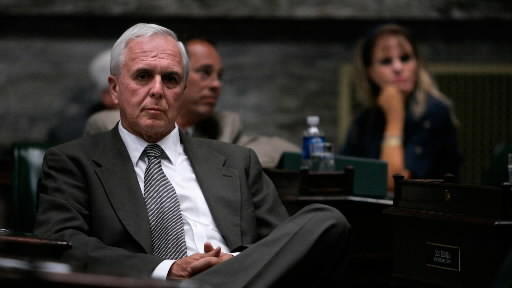Greenleaf Recuses Himself
By Bill White
State Judiciary Committee Chairman Stewart Greeleaf, R-Montgomery, announced over the weekend that he will recuse himself from proceedings invovling House Bill 1947, the child sex abuse statute of limitations bill. I wrote last week about the way Senate rules never result in findings of conflicts, including cases much more obvious than Greenleaf's. At that time, what we knew was that the law firm for which he is a partner had represented a Catholic entity several years ago in its attempt to have Delaware's similar statute of limitations law declared unconstitutional. A law firm that represented child sex abuse victims in Delaware accused Greenleaf of having a conflict, but the Senate parliamentarian ruled there was no problem. I argued that the appearance of a conflict can create credibility problems, even where there's no direct financial interest involved. By then, Greenleaf already had stacked a Judiciary Committee hearing with witnesses who argued the Pennsylvania bill is unconstitutional, and his appearance of conflict made his conduct even more suspicious than it otherwise would have been. As you'll see in his statement below, he says he discovered another child sex abuse case in which his firm was involved, and although he continued to insist he had no conflict, he decided to recuse himself. One of the lawyers who accused Greenleaf of the conflict, Stephen Neuberger, argued in response that the process already has been tainted by Greenleaf's involvement, a reaction I've seen in several other emails since then from victims and their advocates. Neuberger concluded: "The idea is that by his heavy-handed handling thus far, he has tainted the judiciary committee process and improperly influenced its members in a way which his belated recusal makes clear was improper. Because of his many actions and intimate involvement, that taint cannot simply be removed by his stepping aside, so the bill should be released to the Senate floor for a vote. It is the only way to try to remove the taint." Unless I misunderstand Senate rules, Greenleaf may be required to vote in any event when and if the bill reaches the floor of the Senate. Unless the presiding officer concludes there is a conflict, senators aren't permitted to recuse themselves. In any event, here is the text of Greenleaf's announcement. I do think he made the right decision, even if it was made belatedly: I have asked the Secretary of the Senate to review the facts of another legal matter being handled by an attorney in my law firm pertaining to the issues surrounding KB 1947. 1 have asked the Secretary for an opinion and advice on how to proceed. I recently asked the Secretary for a legal opinion regarding a similar case, in which she found no conflict of interest regarding my legislative involvement with HB 1947. An attorney in my law firm is counseling a Catholic clergyman who has provided depositions as a fact witness in civil suits regarding child sexual abuse. The clergyman is not a party to the lawsuits, has not been accused of any wrongdoing and has never been called as a witness in any trial. The Archdiocese of Philadelphia is funding the clergyman’s legal fees. Though I was not personally involved with this client, I believe that it is my responsibility to disclose this development in light of my association with the law firm. I had no personal or private interest in either of these cases, nor did I know of their existence. The law firm with which l am associated employs many attorneys working on a wide variety of litigation. As Secretary Martin noted in her opinion on June 13: “Senate precedent fully supports that a Member does not have a conflict of interest voting on a bill that may or may not impact a client of a law firm with which a Member is associated.” Therefore. I have no conflict of interest in either case. Perception and appearance in ethical matters are important — especially public perception of what legislators do in Harrisburg. In order to project a positive perception, I voluntarily will no longer participate in any further proceedings regarding HB 1947, nor will I vote on the bill.
|
.
Any original material on these pages is copyright © BishopAccountability.org 2004. Reproduce freely with attribution.
